#the negotiating approach
Text
التفاوض الفلسطيني الإسرائيلي بين مقاربتين متناقضتين
التفاوض الفلسطيني الإسرائيلي بين مقاربتين متناقضتين
التفاوض الفلسطيني الإسرائيلي بين مقاربتين متناقضتين
الكاتب : مخرمش أيوب . خميس محمد
الملخص:
تقوم عملية السلام الفلسطينية على أساس مقاربتين متناقضتين لطرفيها،كما أنها تأتي في سياق من عدم التوازن بين قوتي هذين الطرفين، حيث تقوم المقاربة الإسرائيلية لعملية السلام على أساس تخلي إسرائيل عن سيطرتها عن جزء من الأراضي الفلسطينية التي احتلتها عام 1976…

View On WordPress
#Palestine#the Israeli occupation#the negotiating approach#the United States of America#فلسطين.#المقاربة التفاوضية. ; : negotiation#الولايات المتحدة الأمريكية#الإحتلال الإسرائيلي#التفاوض
0 notes
Text
التفاوض الفلسطيني الإسرائيلي بين مقاربتين متناقضتين
التفاوض الفلسطيني الإسرائيلي بين مقاربتين متناقضتين
التفاوض الفلسطيني الإسرائيلي بين مقاربتين متناقضتين
الكاتب : مخرمش أيوب . خميس محمد
الملخص:
تقوم عملية السلام الفلسطينية على أساس مقاربتين متناقضتين لطرفيها،كما أنها تأتي في سياق من عدم التوازن بين قوتي هذين الطرفين، حيث تقوم المقاربة الإسرائيلية لعملية السلام على أساس تخلي إسرائيل عن سيطرتها عن جزء من الأراضي الفلسطينية التي احتلتها عام 1976…

View On WordPress
#Palestine#the Israeli occupation#the negotiating approach#the United States of America#فلسطين.#المقاربة التفاوضية. ; : negotiation#الولايات المتحدة الأمريكية#الإحتلال الإسرائيلي#التفاوض
0 notes
Text
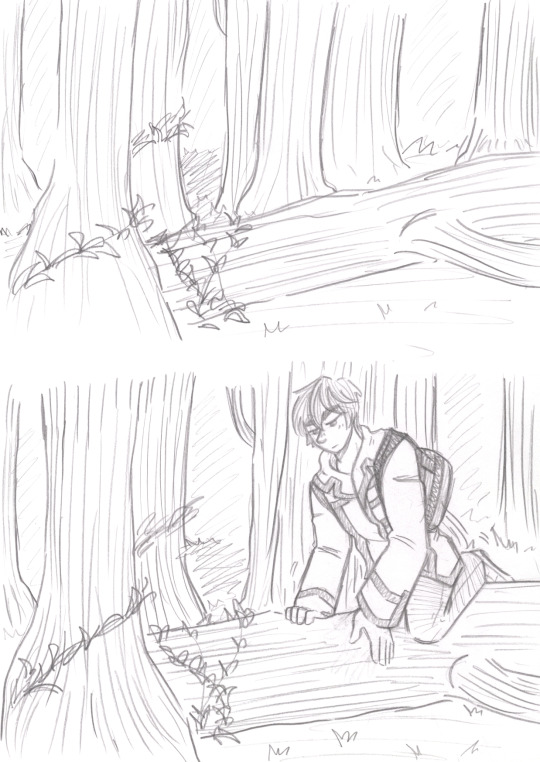
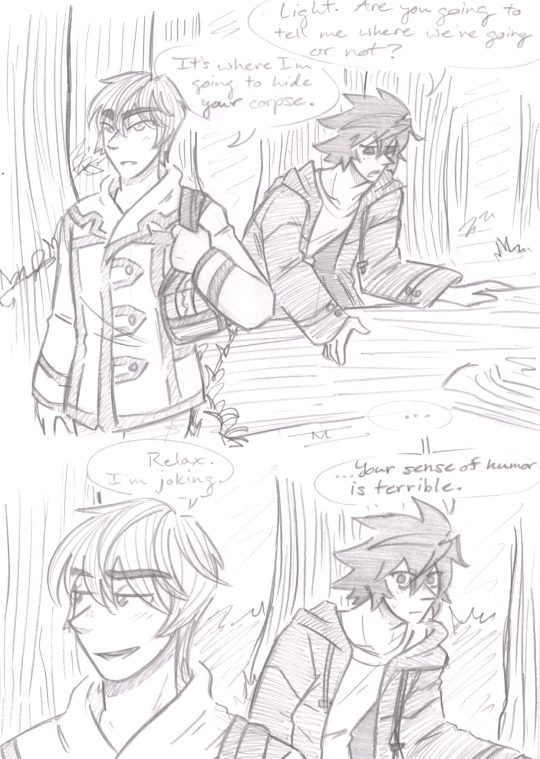
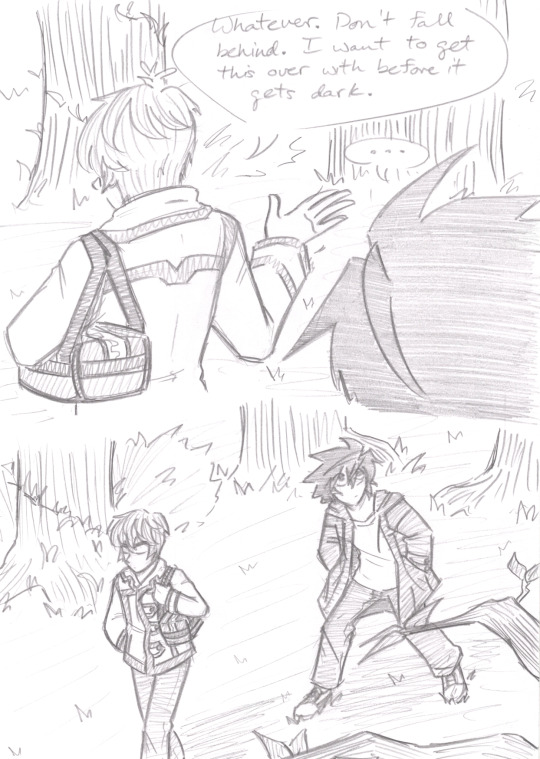
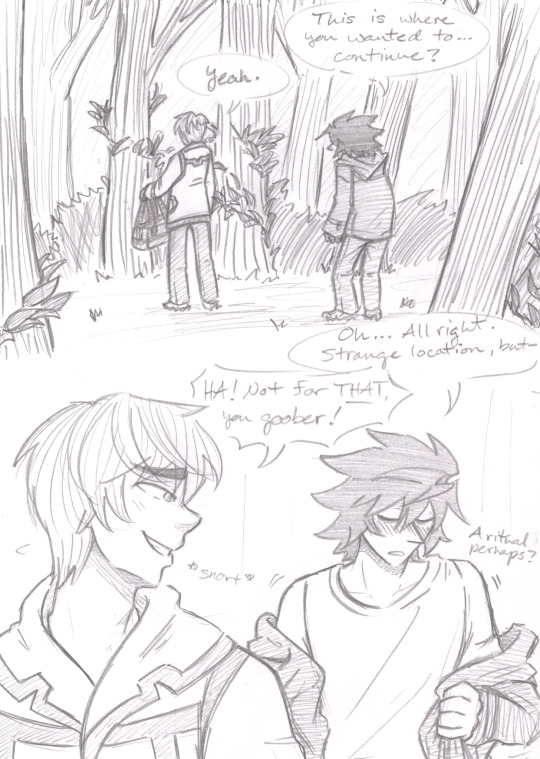
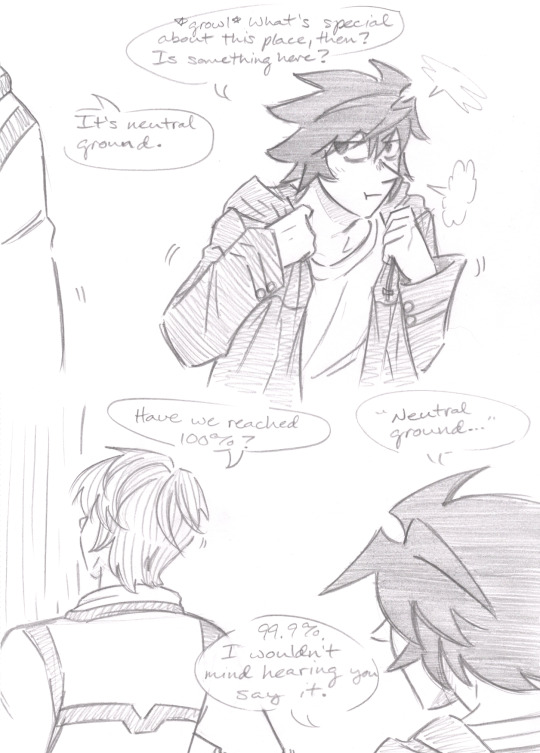

22 more images below the cut (Warning: Less than moral discussion ahead):
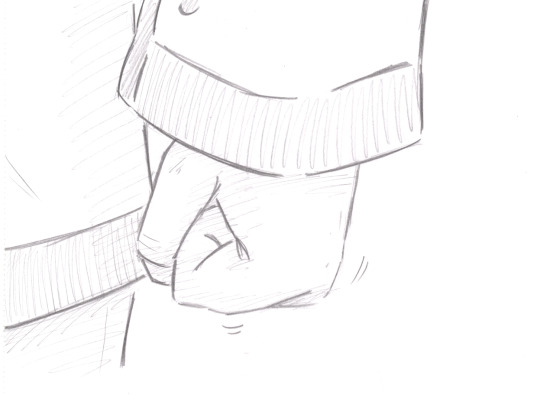
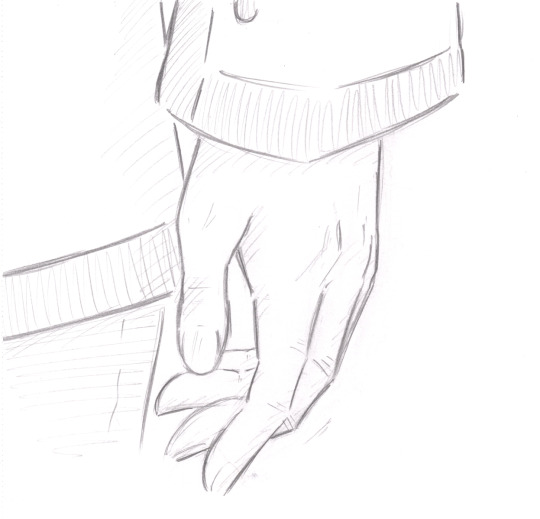
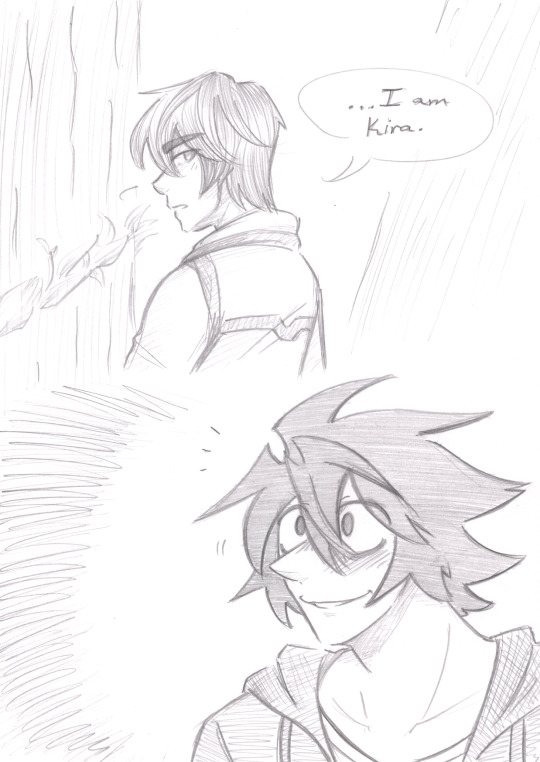
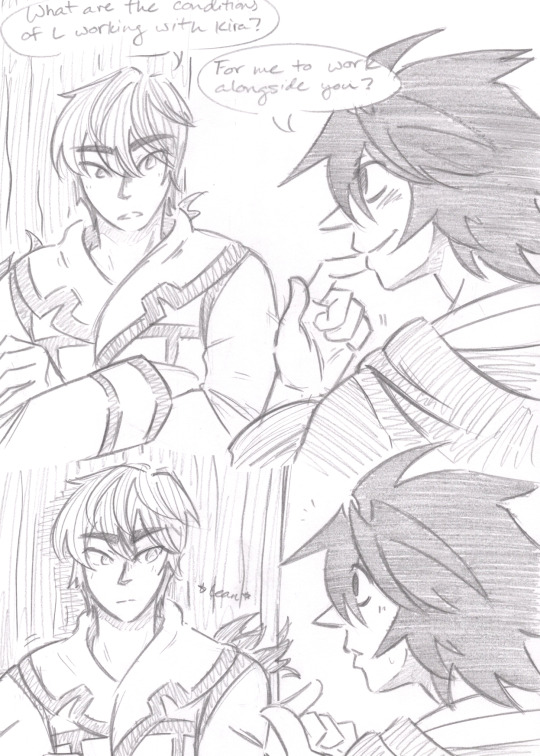

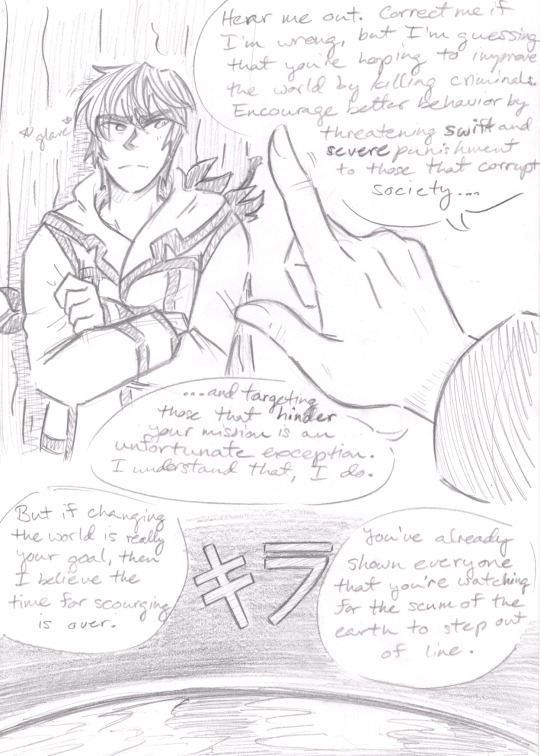
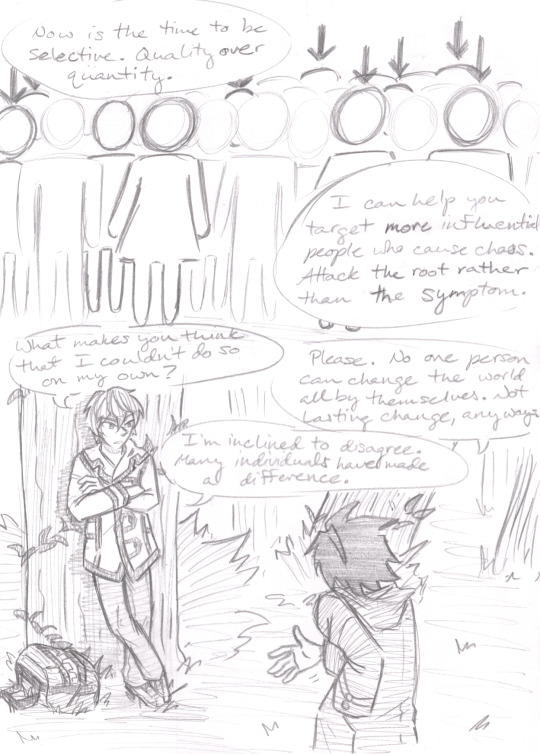
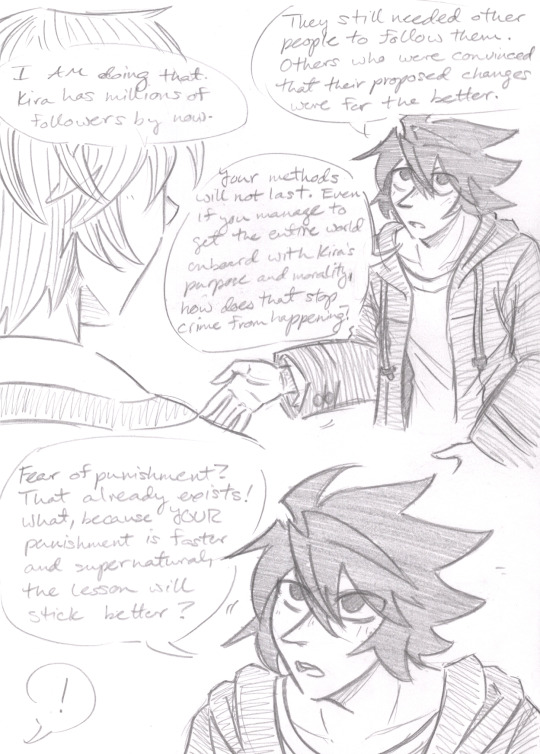
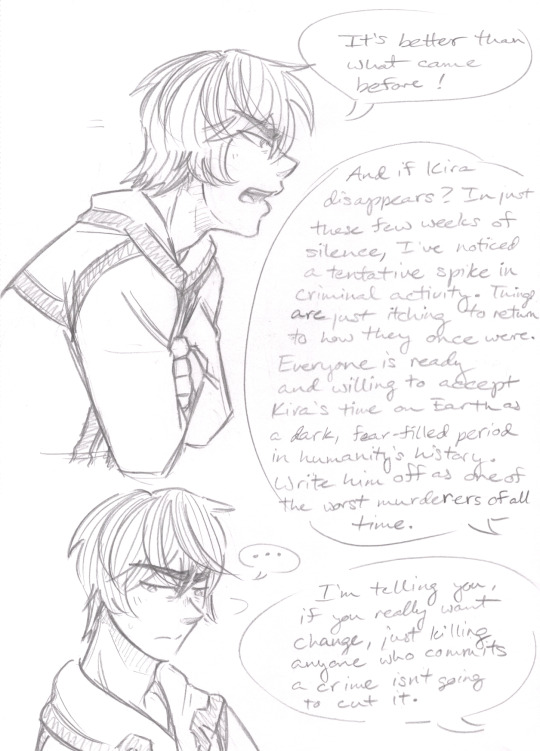
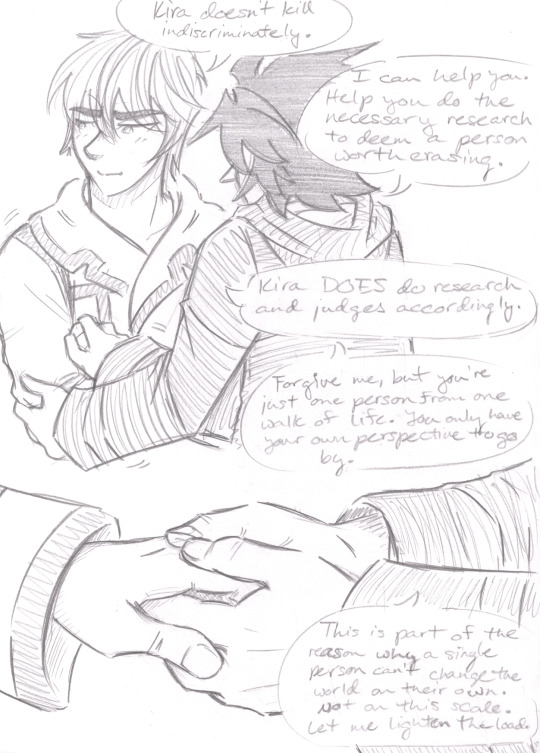

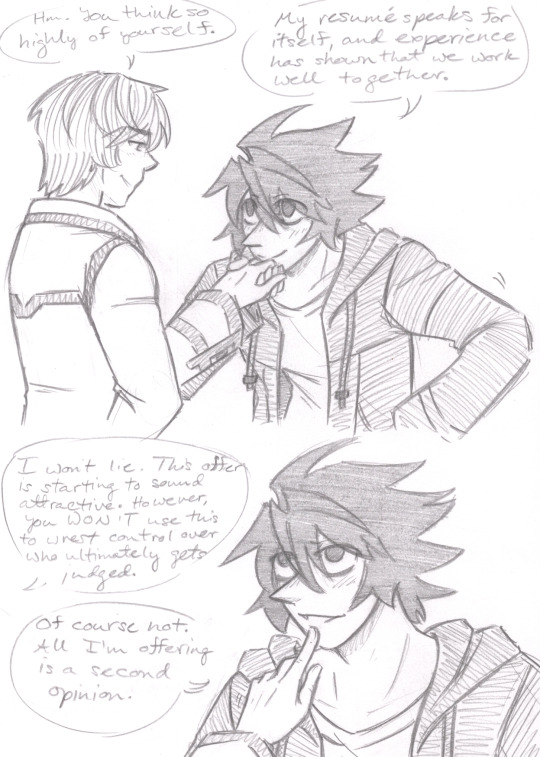

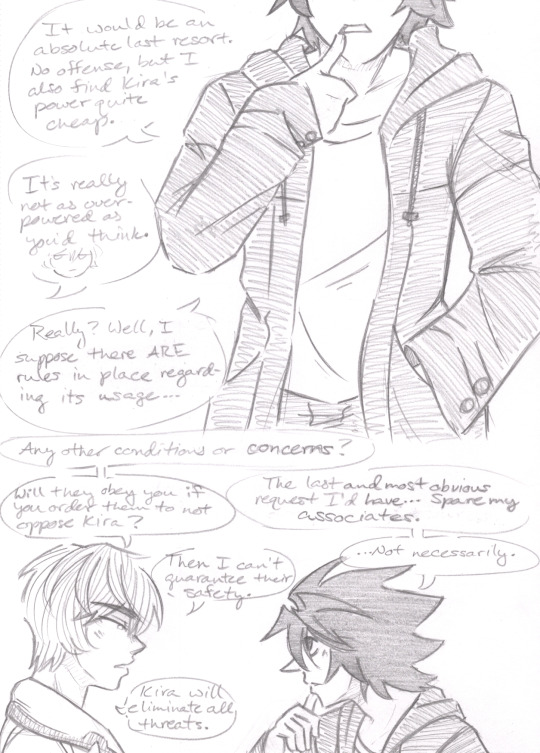
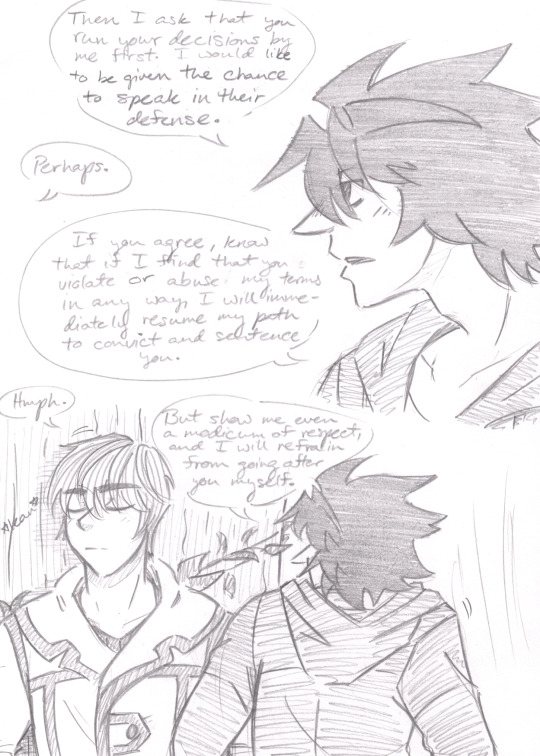
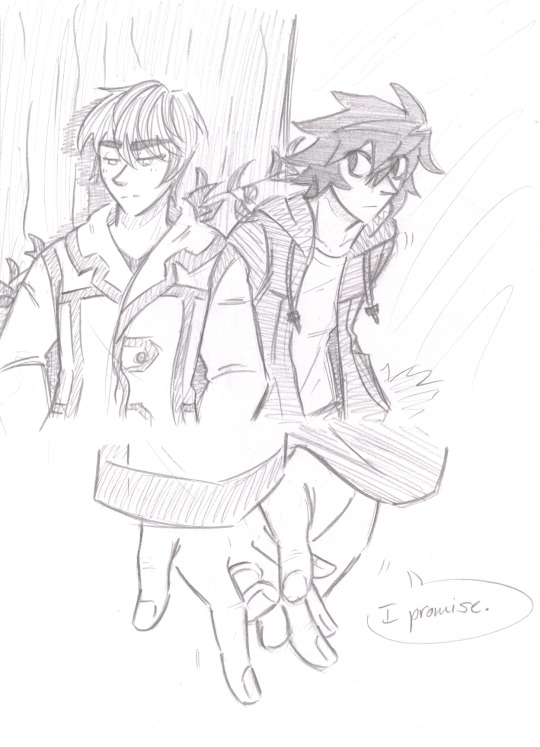
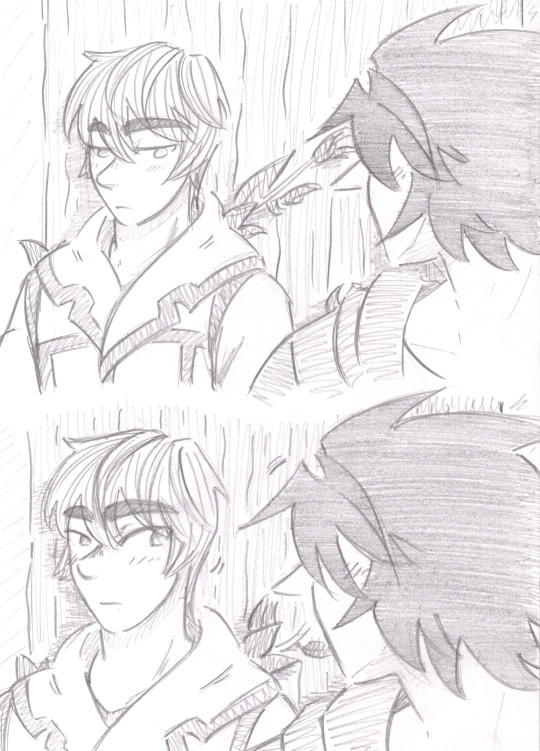

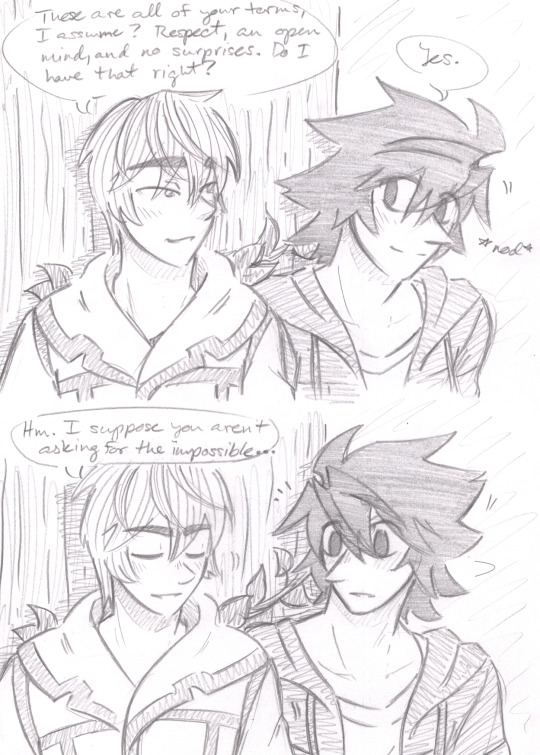
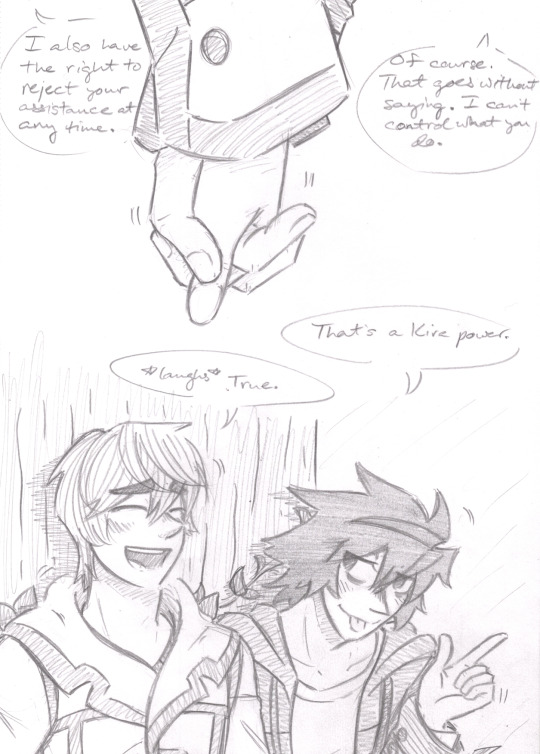

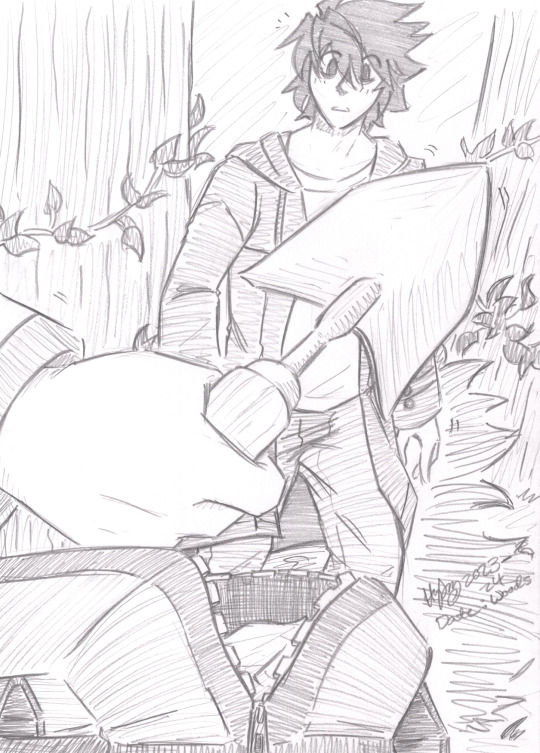
Light leads L to a particular stretch of woods that he calls "neutral ground" and demands to hear L's conditions for him to work with Kira. L tries to explain in a way that will convince Light to accept his assistance. It appears to be successful...
Next
Previous
First
Master List
Transcript
Big Disclaimer here: I, personally, don't condone the "Kira Plan" in any way, shape, or form. I don't even believe that there is a "correct" way to enact it. I am very firmly on the "Anti-Kira" and "Light is a Tragic Character with Bad Coping Mechanisms/Self Delusion" teams. I don't want to spoil too much of what's left of this story, but I do have a plan/explanation in the future~.
#drawn by me#my fanart#my fancomic#Death Note#The Chain#Light Yagami#L#lawlight#morally dubious and pretty darn reprehensible discussion and negotiations#L trying to get into Light's good graces#trying to criticize Light's approach without immediately damning himself#good thing Light’s practically head over heels for him already~#forest and trees#I apologize for the disclaimer there but I find it necessary so people don't get the wrong idea about me#I may love Light to bits but I do think it's an immoral plan that's just plain garbage and an excuse to absolve himself of guilt#and I enjoy watching his and everyone's antics in a Ryuk-esque way because it's an entertaining fictional series/franchise~#this is part of the reason that I was a little nervous to post this entry: that people may try to equate my views with what is written her#henh sorry for the serious stuff in the tags but serious stuff is being discussed in the comic
319 notes
·
View notes
Note
you mention battles usually being an honorable thing. do deaths still happen in them purposefully or is that highly frowned on? what about accidents? do clans have laws or procedures when these things happen?
Deaths in battles are HIGHLY frowned on and a sign something is very wrong.
It doesn't even need to be a death-- mauling is also forbidden. You do NOT harm someone who is trying to flee.
Though accidents happen, in order for the Law of Honor to be respected, both combatants must be 1. Fighting fairly, and 2. Be willing to admit defeat. A warrior could be as gentle as possible-- but if their opponent REFUSES to run despite being clearly bested, it becomes a matter of self defense.
So when a Clan needs the patch of territory to make it through winter, or has to forage for herbs in some place, suddenly, it is not a fair fight. ThunderClan may be within its rights to challenge over Sunningrocks, but in Fall just before the salmon run? When RiverClan needs both sides of the river? There will be deaths.
As-is, there are currently no laws or procedures for dealing with these situations, besides cats who have broken the code being punished by their leaders.
There is an incentive to do this though-- Clans who don't live by the code will be attacked more often, and lose trading rights. Of course... that depends on if the Clan in question actually cares about having relations damaged.
#Clan Culture#Battles#Warrior Cats#I try not to add too many hard laws or rules!#I really love them in other people's rewrites though and I think they add a lot!#For me I find it more helpful to approach it loosely#So that negotiations are more open-ended and less rigid#If there's no protocol in place for these things then I can have a cat demonstrate their diplomatic ability by suggesting something#If that makes sense
203 notes
·
View notes
Text
WAIT I JUST REALIZED

so some dialogue is unique to certain demons even in a negotiation sense so there’s a real chance this stupid bird telling me i suck repeatedly could also be the souls it swallowed doing it
if that’s the case then well done nocturne for destroying self esteems everywhere through the power of birdshit
#i barely used demon negotiation prior#usually only do it if i need extra fodder and don’t have macca#and i don’t think any raptors ever approached me#so i have no idea if this dialogue is unique or not#i hope it is
9 notes
·
View notes
Note
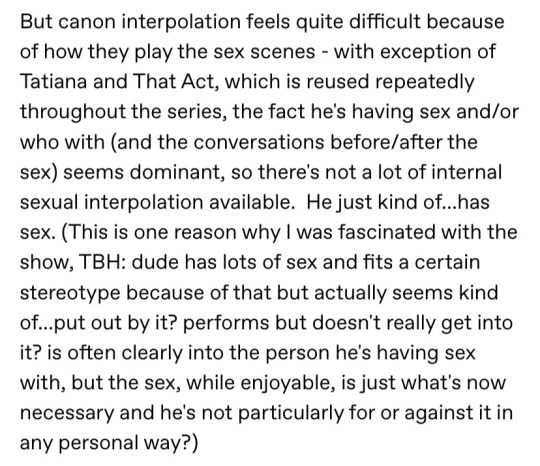
I clipped this from your post because it’s easier than trying to inaccurately summarize! But I was wondering what you think about this dynamic. Whether you see it as a core part of his characterization and what you think it says about him, or whether you see it as kind of a visual shorthand in the series that isn’t indicative of anything about his approach to sex? It seems to me to be very consistent over the years and I’m curious about your take.
Yeah I think the repetition/consistency in how they show this makes it a super deliberate and very core part of his character, at least in how I read it – wouldn’t be nearly as fascinated with the story if it wasn’t.
And I don’t think it’s an accidental visual shorthand because of that repetition. I remember reading somewhere CM said that in S6’s TxL hotel sex scene they actually filmed two full sex scenes, one on the sofa and one in the bed – but in the end they only showed the last few seconds in the bed focused on the faces, as better articulating the purpose of that scene. I think they are very particular about how and what they show about Tommy having sex.
The particularity does add to this sense of overly-performative sex (EVERY sex scene feels performative and slightly contrived to me, even Tommy with Grace, even him using passionate sex with Grace in S3 to distract her XD, even him drunkenly/passionately sealing the ‘transaction’ with Lizzie in S5’s My Property scene) but I think they manage to stay on the side of the line that it feels like Tommy being consciously performative/contrived, rather than feeling like I can see the director’s hand. It’s the same sense when looking at Tommy’s various desks: yes his desks absolutely reek of being a contrived stage, but it’s *Tommy* being conscious about setting the stage, not the set designers/directors.
My reading / what I think the sex says about his character:
his ‘thinking mind’ constantly tries to frame sex as a transaction because he sees himself/his labour/his work/doing killings/offering sex – basically any act of his body as the fundamentality/essentiality of labour – as a unit he can trade for something else he wants. There’s some kind of less thought-out complex/trauma background thing here, where he believes that his worth is only what he can bring in and do for the family – labour, killing, smarts, sex, whatever. Mostly that’s his intelligence/schemes/business smarts, or his ability to push through risk/stress for high stake outcomes (stretching to do things they won’t out of fear), but sometimes that’s also his body (if combined with intelligence - trade your goods smartly, not stupidly, for advantage worth more than the momentary loss of bodily boundaries).
his ‘unthinking mind’ does actually want sex physically because it feels good. Physical release/oxytocin/endorphins etc? libido? I assume this, because otherwise they just wouldn’t bother showing him seeking out prostitutes; he’s not doing that for ego because he was satisfied in S1 that people thought he wasn’t having sex even though he was. But he is also sort of scared of sex because it leads to an intimacy that he can be used or hurt through it, hence why he defaults to prostitutes (S1, S2, S4 - or even the Zelda fling/no possible relationship) when he’s most wounded. Could theorise this is due to actual sexual abuse, but seems more like it’s because he hurts so deeply every time he’s connected deeply with someone – he loved Greta and was broken when she died, he loved Grace and was broken when she died - so, this supports his transactional approach because transactions are conditional, negotiated up front, well defined and ‘safe,’ they can’t get intimate or personal. He can use the transactional approach to justify himself seeking sex, while at the same time netting him something which feels good.
But whatever’s in the middle of the above two, is actually madly desperate for personal connection and intimacy. Despite him trying to apply sex transactionally or as a feel-good-only thing, he falls into some kind of intimacy and connection with the people he has transactional sex with, so frequently it’s a definite pattern. (I could write absolute buckets about May right here)
Even when he tries to avoid intimacy/connection – prostitution - returning from war, he sticks with one prostitute and has a very intimate connection with her? All right that's not typical?? And between S3 and S4 when the family’s shunning him, instead of just being promiscuous and anonymous, instead he has a relatively small rotation of regular prostitutes, knowing their names by preference to anonymity? Even the scene we see where he insists on someone new that he doesn’t know, this sparks from Lizzie pushing him about family/intimacy/connection. I read that almost as a “look at me Lizzie I don’t NEED connection stop pushing me” in front of her to try to make a point (to her, who used to be his intimate sexual connection, in a way that hurts her too to put her in her place? to himself?), immediately followed by him handing Lizzie cash/emphasising transactional approaches. And this is then followed by that absolutely hysterical fail of a sex scene with the ‘someone new’ prostitute, which I swear is filmed to show Tommy did not, in fact, have any sex, or if he did, it was so lame they didn’t even muss the bed.
Even S6 and the prostitute in America, it’s fascinating they make the effort of showing that having happened, but then focus so much on all the intimacy/connection in the phone call with Lizzie/kids. He needs sex but he's hungry for connection and made vulnerable by intimacy.
(And I could go on about the number of ‘woman on top’ scenes and why that particular position, or specifically the filming/dialogue with May which is one of the more fascinatingly filmed and verbalised transactional relationships because of her class, or why I think Lizzie, the actual prostitute, has the least amount of flesh/nudity showing at all from all his women while he's often MORE naked/exposed in their scenes -- I’ve only been able to watch properly the once through, but had so many thoughts on how they dealt with the framing/camerawork.)
But all up, it feels like it’s trying to show him as a character who performs sex to get something out of it that’s not sex (transaction/treats self as a fundamental labour unit of exchange), but still needing/wanting/enjoying sex (because otherwise why would he pay for prostitutes/why even put sex on the negotiating table men don't do this??), but also constantly he cannot shut down this tendency/urge of his to more softly want/need personal connection almost more than the sex.
It’s just not a common way to portray a guy ruthlessly heading a gang, and that’s why I think it’s so deliberate. They take the expected image of how a guy heading a gang would approach sex (prostitutes, seduction, sexual prowess etc) but it feels like they’ve turned that expected image/action well on its head (cares for prostitute/s, suffers the Mosley-threat and Diana-rape, sexual prowess is mostly in service of women, attempts to depersonalise himself to a unit of trade), and then they use camerawork and the pre-post conversations to show this intriguing drive for intimacy instead of sex.
I hope that’s answered the question? It’s tricky; some of these thoughts more suited to a conversation/branching dialogue than a single post or I get repetitive XD
Tangentially, there’s more thoughts too on how they weave prostitution through as a theme, or the way he’s often in conflict between those motivators of ‘transaction/physical/intimacy’ -- he trips himself up; he gets hurt by trying to lean into one or two of those, and forgetting the other/s, and can’t really ever get them in balance.
#honestly this is why i looooove your omegaverse because replacing questions of sexuality.gender.libido with 'male presenting omega'--#--it becomes a question/exploration about what drives him more personally XD#i find the canon arc about his sex/sexuality interesting because the approach feels more like a woman if not quite a femme fatale#there's just something about him as a gang leader being so up front about considering himself as part of an offer in a negotiation#then fucking it up *for himself* by liking women too much#i reckon this is why he gets so hurt by alfie too -- for all it's not sex he's just desperate for connection and connects with alfie#the s3 warehouse scene just drips chemistry/connection/hurt/relationship; and then alfie goes and hurts him too#fascinating he then runs from that and a breakdown and all s3/s4's trauma into a marriage#my meta suffers from my inability to sit down and rewatch the series so plsforgive that most is intuitive first reactions --#--and notes-based than than double-checked/substantiated XD
17 notes
·
View notes
Text
Jango Fett Open Seasons: Retreat vs. fight no matter the cost
Another detail from Jango Fett: Open Seasons that I find very telling about characters is their approach to retreat. I’m specifically want to talk about the four major Mandalorians - Tor Vizsla, Jaster Mereel, Jango Fett and Montross as they all were at some point in the story put in situation when they needed to decide to continue fight no matter the cost (in theory the ideal Mandalorian warrior mindset) or to prioritizing their people’s life (a choice testifying to good leadership). And yes, those situations weren’t always exactly the same yet similar enough to see the implied(?) similarities in theoretical dissimilar characters.
So we have Jaster Mereel, the original leader of True Mandalorians. During a mission on Korda Six, when Mandalorians came across the enemy's heavy fire (and Jango ordered his people to find cover), Jaster gave an order to regroup at Jango’s location - the safest place and abort the air strike.
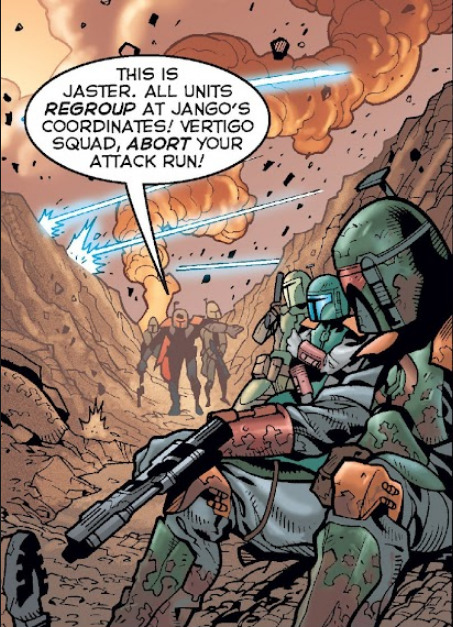
And once it became clear, they made a mistake to rely on second-handed intel - but before they learned it was Death Watch's trap - Jaster decided to abort the whole mission. Something quite different from what Jango will teach his son decades later (“Your loyalty, your honor – these are the things that matter. When you accept a mission, when you give your word, it is all that matters.”)

Montross however refused to regroup at Jango's location
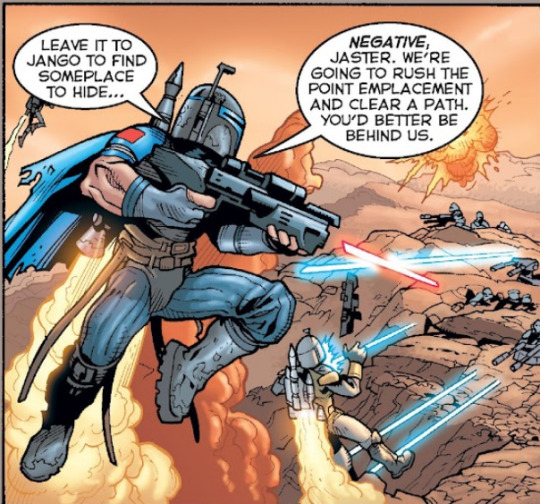
and continued the attack, stating "we've never abandoned a mission!"

Montross survived thanks to Jaster who personally came to his aid only to betray his leader and leave him behind once Tor showed up. And while he tried to take command of True Mandalorians, he did order an evacuation, as the "Jaster's last order still stands" argument.
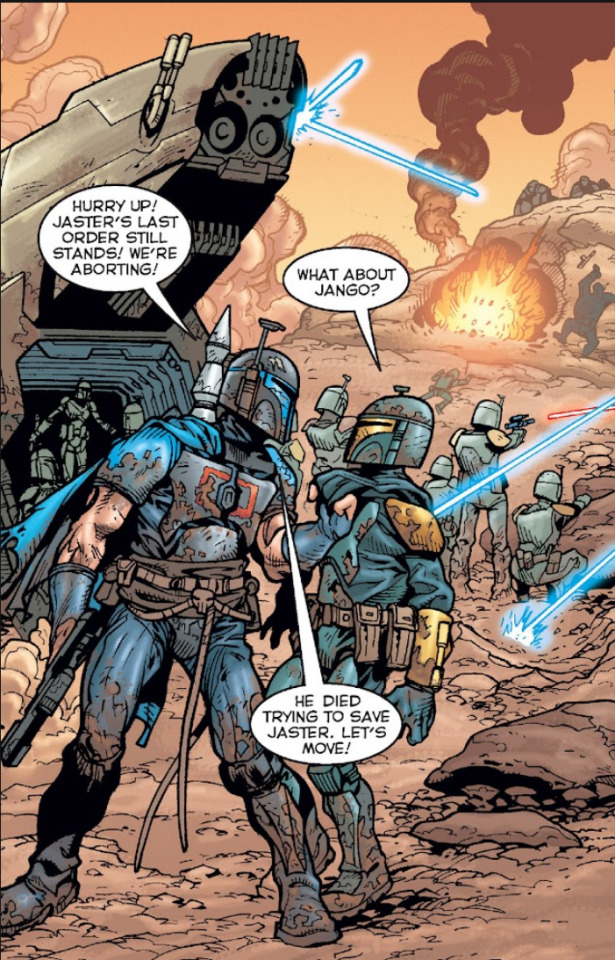
Then we have Tor Vizsla who during Jango’s attack on Death Watch’s ship, ordered everyone to evacuate.

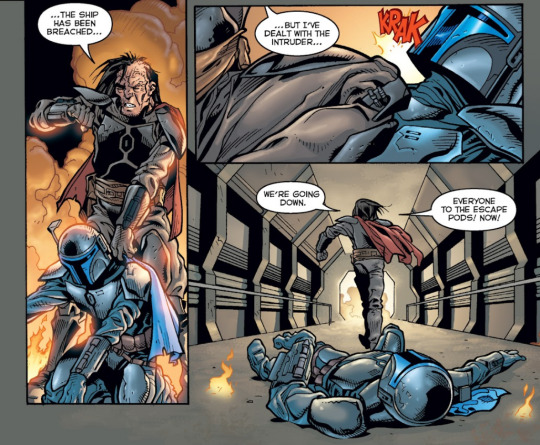
And now, let’s talk about Jango Fett who started very much minded like Jaster, what was the best visible on Korda Six. The mission was his first official role as Squad Commander but he didn’t allow pride or desire to make Jaster proud to take over common sense. When it became clear his men were under too strong enemy’s fire, he ordered them to get into trenches / find cover.
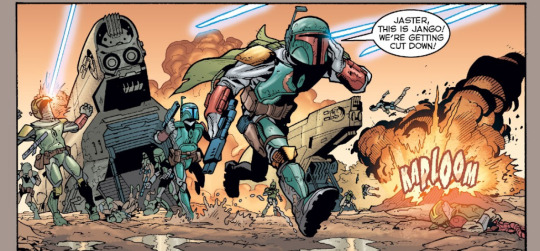
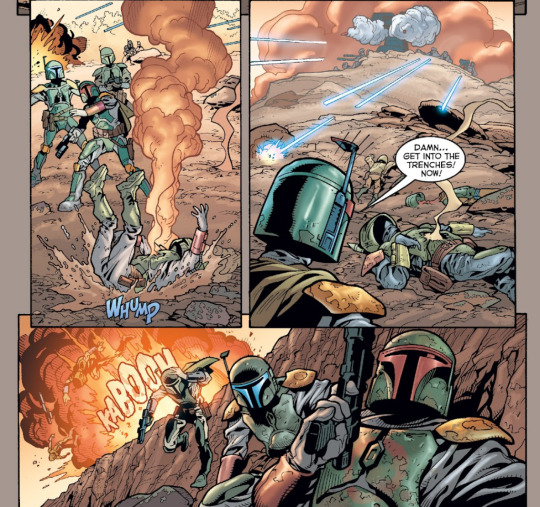
However on Galidraan, as a leader of True Mandalorians, when he already knew they walked again into Death Watch’s trap, instead of de-escalate threat of the Jedi by at least trying calm down the situation and presenting what is going on behind the scene- and mind you, the Jedi did not have all facts but Fett already met Vizla at Governor's residence and as he wore helmet at that time, most likely had recorded this, not to mention all Mandalorians could present what they were doing and where they were via the recording from helmets - Fett ordered to open fire. And the Jedi naturally responded as such.


(And really, if Fett was smarter he could at least try to turn Jedi against Death Watch).
This is even more surprising choice as Jango's first reaction upon seeing Republic shuttles before even meeting eye to eye with Jedi was to call his second-in-command to order an evacuation.
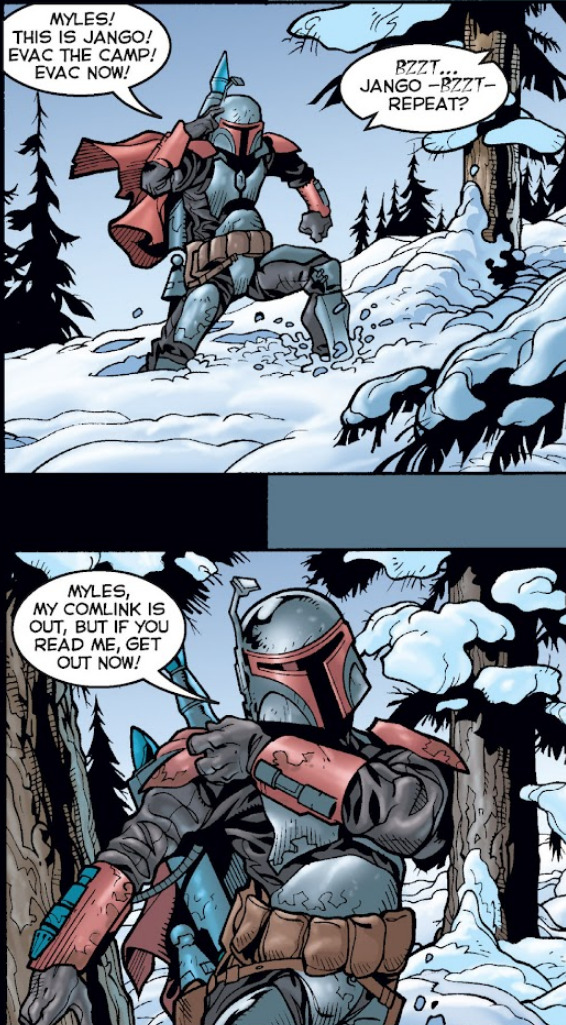
Which is pretty ironic, that both Jaster and Tor, despite their ideological differences, were at some point shown to prioritizing their men’s safety by ordering retreat / evacuation, while Jango started as similar minded (Korda Six and upon seeing Republic shuttles on Galidraan) but once Jedi showed up, his attitude changed into “no running, fight whatever the cost” which not only led to great tragedy but made him more like Montross.
#star wars#jaster mereel#tor vizsla#jango fett#montross#mandalorians#mandalorian culture#jango fett: open seasons#is one of my top fav sw comics if someone still didn't notice#but really i live by the thought that jaster and tor were more alike than one may think at the first sight#you can pry it from my cold dead hands#and the irony that jango started like jaster but somehow his approach to bounty hunting / mercenary job strayed from Jaster's mindset#also WHY JANGO YOU ORDERED TO ATTACK JEDI AND DIDN'T LISTEN TO YOUR FIRST THOUGHT TO EVAC THE CAMP ASAP?!#look galidraan is a traumatic for mandalorians and they can hate jedi and all#but it was jango who escalated the conflict#i think jango operated on the idea the jedi were lied about the situation (RIGHT) and won't listen (WE WILL NEVER KNOW)#but he could at least try to negotiate / talk / present their true object aka stopping dangerous Death Watch#and then turn to violence if jedi showed zero intention to solve the problem in more diplomatic way#especially since jedi did not make a surprise attack and openly approached the mandalorians#anyway from the all Mandos I think Montross was the worst bastard as sure Tor was a cold-blooded killer but he has some common sense#to evacuate his men when situation calls the same as jaster#while montross tooks his pride over safety of comrades?
22 notes
·
View notes
Note
hello! thank you for replying to my ask abt finding the enthusiastic consent post. i’d like to ask about your approach towards writing death? whether it’s evolved over the years? the representation of death in media vs your own preferred version in fiction. also! what does death mean to ash glashtyn?
Hi anon!
Those are some huge questions, and I definitely can't answer them all in a lot of detail otherwise I'd be writing a 6,000 word post. So I think we need a cliff notes version or something.
I suppose I'd first say there's a lot of different kinds of deaths, and a lot of different ways to feel about it. So I can't give you a neat answer because my approach to writing death is 'treat every situation as unique' and not some kind of unified approach?
I don't even treat it with the same level of respect every time, depending on whether the death is a character we've never gotten to know, vs. if it is one we have, vs. (in the case of murder) how the character doing the character feels about it, vs. whether the character dying is a villain or a hero or neither. How I approach Augus hunting vs. Gwyn killing the otterkind family vs. Mikkel dying were all extremely different. There's no...similarities between them re: how I thought about them!
Therefore, I don't know whether that's something that's evolved over the years. The fact is, I don't sit there thinking 'what's my approach to writing death' before writing it, I just write it. I know I'm influenced by the many books I've read and philosophies I've read and more, but I don't have rules about it or anything like that. I just try and write it with the weight it deserves in the moment. Sometimes, that's no weight at all. Sometimes it's with a great deal of lasting gravitas. Death is ordinary and profound depending on who it's impacting, why, and how folks are thinking about it. And that's the same as with everything ordinary and profound (like sex, and people being born, and everything in between).
the representation of death in media vs your own preferred version in fiction
Tbh idk! There is no unified, universal way of 'representing death in the media.' It changes! It changes within the same series! How Scrubs wrote death in its media depended on the characters being impacted and the point of it! Sometimes it was comical and mundane, sometimes it would have you weeping, there's no such thing as a unified representation of 'death in the media' and I don't have a 'preferred version' in fiction. I have written mundane death, unimportant death, ugly death, grotesque death, meaningful death, profound death. And as with everything, it just depends on what that part of the story calls for.
I would also say quite honestly I don't really care about how I represent it that much. Like, I care as much about it as I do about any part of my writing. It's not a core reason behind why I write and it's not crucial or fundamental or really important in many of my stories. Like, it's not that 'I don't care' - but I'm not researching death and the symbolism of death the way I'm researching trauma and trauma recovery, anon. I have only ever bought one book on death. I have bought over 50 on trauma.
(For those curious about death narratives in general, I highly, highly recommend the series Six Feet Under, which was quite ahead of its time across a few different areas, but is one of the best shows - hands down - for the many different ways we can look at death, and the many different things it can mean to us, from nothing, to everything).
what does death mean to ash glashtyn?
You're not gonna like this anon, because my answer is going to be 'see above.'
As in, it depends! How Ash feels about his own death changes over time. How he feels about the deaths of others depends on who it is that's dying, and his connection to that person, and that will also not be static and going to change over time!
I don't actually know of anyone who always sees death the same way, of every person, all the time, always. That doesn't mean people like that aren't out there! But generally speaking how someone feels about the death of say, weeds they're pulling out of the garden, is going to be very different to their own death, the concept of death, and the death of their loved ones. We are often negotiating our relationship with death, from the moments we don't negotiate it at all because we deem the death/s insignificant (people killing cockroaches come to mind, or people not thinking about the creatures in their back garden dying every second), to the moments we deem it significant because of the person's closeness to the person or creature (or plant or object) that has died.
The ordinary/profound things in life just require a natural fluidity, because they're not static even though they're ever-present. I can't pin any single thing down on the page, anon, because there are an infinite number of ways to respond to and think about death, and an infinite number of ways for the mass media to conceptualise it, and for folks like me to write it.
I have no rules, I have no single approach. Sometimes it matters, sometimes it doesn't. It's...very...not something I can pin down, I'm afraid!
#asks and answers#ash glashtyn#fae tales#fae tales verse#pia on writing#death is both not special at all#and very special#depending on how it comes into my lives#it's going to matter to me a great deal for example when my loved ones die#and yet it doesn't matter to me in the same way#when i pull out a weed in the garden#even if i mentally experience a pang for snuffing out its life#(something many people never bother to feel)#almost no one holds funerals for weeds anon#we must all negotiate our own fluid ways of relating to death#i hope i never have firm rules for writing it or approaching it#death itself denies it#administrator gwyn wants this in the queue
7 notes
·
View notes
Text
btw i approached HR today and asked about the extra pay im owed for taking on higher duties ($$$$as outlined in the staff manual :) $$$$$)
#i didnt specify getting backpaid but I DID say ive been doing these higher duties all month!!#and that i check my payslip lol!#i was pumping myself up to have to approach and negotiate my salary but instead. when i actually looked#there was already a clause in the orgs documentation about it :')
9 notes
·
View notes
Text
Horst: It's not very sociable in these barracks. [He laughs.] Is it?
Max: It's all right.
Horst: Right. You got a yellow star.
Max: [pointing to Horst's pink triangle] How'd you get that?
Horst: I signed a petition.
Max: And?
Horst: That was it.
-
Martin Sherman, Bent (1979)
#100plays#martin sherman#bent#modern theatre#queer theatre#theatre quotes#1979#for context‚ Max negotiates his way to Jewish identification rather than the pink triangle on entering a concentration camp#setting in motion the key subject of disagreement between him and Horst#Horst is proud of his identity as a gay man‚ even with the mistreatment it brings him (as much from fellow prisoners as from the nazis)#whilst Max considers himself a realist and a deal maker‚ who cannot fathom why anybody would willingly endure something they might avoid#the question of identity and the approach to self identity is a recurring theme; Horst takes strength from his identity where Max#considers it weakness and shrouds himself where possible. it's mirrored wonderfully in a later scene‚ after Max trades oral sex with a Nazi#commanding officer in return for medicine‚ and he and Horst debate whether the man is queer and how important it was to him that the man#who went down on him was (apparently) Not queer; that in bartering sex with a gay man the captain may have had to face the idea#that he himself might be gay‚ but by fucking a 'straight' man he can retain his heterosexuality. it's a semantic exercise to some degree#but one with life or death stakes (Max is sure he would be killed if the captain suspected he was gay)#the petition Horst refers to was Magnus Hirschfeld's‚ the german sexologist who so revolutionised the understanding of queer identities#and whose work was denounced and destroyed by the nazis. it's another indicator of Horst's personality and his personal comfort in his own#sexuality compared to Max#it's worth noting too that the way Max 'proves' his heterosexuality‚ although relayed secondhand‚ is one of the most upsetting#and devastating things I've ever read. this play is not for the faint of heart or the easily disturbed. but maybe it should be experienced#by them too
3 notes
·
View notes
Text
You know what makes me feel a little like swinging him around like a stuffed toy it’s that pretty much every single other cast member will self-sacrifice on purpose for the greater good. jay will not. this makes him a bit selfish, yeah sure, but it also makes him way too much of an optimist for how much of a pessimist he is — jay wants a solution where everyone is happy, and crucially, he considers himself someone who should also get to be happy. That’s a thing that he wants to assert should be able to happen!! so much so that sometimes he forgets that other people do not have the same idea of happy, and having a perfect ending may not be possible or strategic with the path they’re all on. he doesn’t want to change the plan AROUND someone’s sacrifice. he’s not looking forward and planning, he’s not willing to budge more than a few feet into an uncomfortable pool if he doesn’t know he can leave or he isn’t forced. This is why he is not the tactician and he doesn’t really like being in the lead but he Is the mood lifter and likes attention and it is also why I want to put him in a hydraulic press. every time he gets hurt which he sometimes does pretty badly it was not because he chose to do so he doesn’t want to do that but every time he ends up being in the spotlight we get a picked off plotline because he needs to be on his own to Do Something but he just wants everything to be fine and everyone to be okay
#i think that he is. (GRABS HIM).#mine#he’s interesting I want to rotate him.#something happened to me after season………..4#weird little plastic brick. he doesn’t even really WANT to go save the world he wants to save his family#he and kai are similar in that way. Kai isn’t a selfless hero either he wants his family to be okay and he wants bullies Out#which most of the time include the bad guy of the week#Kai would march up to them and swing first if he saw them hurting someone but jay would see them turn on Kai and then go oh square up squa#the most follower of the whole team. also turning out to be the most… approachable? not really. but he tries to negotiate first#hitting him with a hammer sorry
6 notes
·
View notes
Text
#2024 salary trends#accomplishments documentation#achievements showcase#achieving salary goals#additional benefits negotiation#career advancement#career development#career success#commitment#communication skills#continuous learning#economic conditions#extra responsibilities#feedback solicitation#financial prosperity#industry trends#JobsBuster blog#market rates research#negotiation preparation#negotiation timing#networking#performance evaluation#proactive career approach#proactive efforts#professional growth#salary benchmarking#salary increase techniques#salary increment#salary negotiation#salary negotiation skills
0 notes
Text
For years, the people of the Kitasoo/Xai’xais First Nation watched over their waters and waited. They had spent nearly two decades working with Canada’s federal government to negotiate protections for Kitasu Bay, an area off the coast of British Columbia that was vulnerable to overfishing.
But the discussions never seemed to go anywhere. First, they broke down over pushback from the fishing industry, then over a planned oil tanker route directly through Kitasoo/Xai’xais waters.
“We were getting really frustrated with the federal government. They kept jumping onboard and then pulling out,” says Douglas Neasloss, the chief councillor and resource stewardship director of the Kitasoo/Xai’xais First Nation. “Meanwhile, we’d been involved in marine planning for 20 years – and we still had no protected areas.”
Instead, the nation watched as commercial overfishing decimated the fish populations its people had relied on for thousands of years.
Nestled on the west coast of Swindle Island, approximately 500km north of Vancouver, Kitasu Bay is home to a rich array of marine life: urchins and abalone populate the intertidal pools, salmon swim in the streams and halibut take shelter in the deep waters. In March, herring return to spawn in the eelgrass meadows and kelp forests, nourishing humpback whales, eagles, wolves and bears.
“Kitasu Bay is the most important area for the community – that’s where we get all of our food,” Neasloss says. “It’s one of the last areas where you still get a decent spawn of herring.”
So in December 2021, when the Department of Fisheries and Oceans withdrew from discussions once again, the nation decided to act. “My community basically said, ‘We’re tired of waiting. Let’s take it upon ourselves to do something about it,’” Neasloss says.
What they did was unilaterally declare the creation of a new marine protected area (MPA). In June 2022, the nation set aside 33.5 sq km near Laredo Sound as the new Gitdisdzu Lugyeks (Kitasu Bay) MPA – closing the waters of the bay to commercial and sport fishing.
It is a largely unprecedented move. While other marine protected areas in Canada fall under the protection of the federal government through the Oceans Act, Kitasu Bay is the first to be declared under Indigenous law, under the jurisdiction and authority of the Kitasoo/Xai’xais First Nation.

Pictured: "In some ways, I hope someone challenges us" … the Kitasoo/Xai’xais stewardship authority.
Although they did not wait for government approval, the Kitasoo did consult extensively: the declaration was accompanied by a draft management plan, finalised in October after three months of consultation with industry and community stakeholders. But the government did not provide feedback during that period, according to Neasloss, beyond an acknowledgment that it had received the plan...
Approximately 95% of British Columbia is unceded: most First Nations in the province of British Columbia never signed treaties giving up ownership of their lands and waters to the crown. This puts them in a unique position to assert their rights and title, according to Neasloss, who hopes other First Nations will be inspired to take a similarly proactive approach to conservation...
Collaboration remains the goal, and Neasloss points to a landmark agreement between the Haida nation and the government in 1988 to partner in conserving the Gwaii Haanas archipelago, despite both parties asserting their sovereignty over it. A similar deal was made in 2010 for the region’s 3,400 sq km Gwaii Haanas national marine conservation area.
“They found a way to work together, which is pretty exciting,” says Neasloss. “And I think there may be more Indigenous protected areas that are overlaid with something else.”
-via The Guardian, 5/3/23
#indigenous#indigenous issues#indigenous sovereignty#canada#british columbia#land back#first nations#tribal sovereignty#pacific northwest#marine protected area#conservation#sustainability#overfishing#marine science#canadian government#kitasoo-xai'xais#direct action#good news#hope
11K notes
·
View notes
Text
If ghosts are declared legally neither sentient nor sapient >.>
Then? LEGALLY? Anything they do? They can't be held responsible for. After all, they don't know any better.
Danny should start a harrassment campaign. Clear Activist actions. Publicly. Loudly. And with the world watching. Wear it on a tee-shirt. Keep repeating it.
"I'm not legally sentient or sapient. Not MY decision, this is what YOU decided."
Openly steal from the rich. Like, OPENLY and on a petty level. Sweep wall street. Hit major companies for food and water and give it too people. Kick presidential candidates in the balls. Cause expensive but not life treating inconvenience to the world.
You can't be a criminal, after all.
It's literally the Jesus approach. "Turn the other cheek". If you strike me AGAIN, you are acknowledging me as an equal. So which is it, oppressors? Am I less then you and free to rebel, or am I equal and capable of being held accountable?
Charm campaign with his enemies money. End world hunger. Take their wealth. Chaos and Discord. No, sorry, you CAN NOT negotiate with me! I'm INCAPABLE remember?
Neither sentient nor sapient!
Shame. Better fix that! Hey? Who's yacht was this? YEET! Guess it doesn't matter now! It's in ORBIT! Have a GREAT daaaay~☆
6K notes
·
View notes
Text
In recent posts I've complained that a lot of tabletop RPGs which toss around the term "fiction first" don't actually understand what it means, and I've been asked to expand on that complaint. So:
In my experience, there are two ways that game texts which want to position themselves as "fiction first" trip themselves up, one obvious and one subtle.
The first and more obvious pitfall is treating "fiction first" as an abstract ideology. They're using "fiction first" as a synonym for "story over rules" in a way that calls back to the role-playing-versus-roll-playing discourse of the early 2000s. The trouble is, now as then, nobody can usefully explain what "story over rules" actually entails. At best, they land on a definition of "fiction first" that talks about the GM's right to ignore the rules to better serve the story, which is no kind of definition at all – it's just putting a funny hat on the Rule Zero fallacy and trying to pass it off as some sort of totalising ideology of play.
A more useful way of defining "fiction first" play is to think of it not in terms of whether you engage with the rules at all, but in terms of when they're invoked: specifically, as a question of order of operations.
Suppose, for example, that you're playing Dungeons & Dragons, and you pick up the dice and say "I attack the dragon". Some critics would claim that no actual narrative has been established – that this is simply a bare invocation of game mechanics – but in fact we can infer a great deal: your character is going to approach the dragon, navigating any inclement terrain which lies between them, and attempt to kill the dragon using the weapon they're holding in their hand. The rules are so tightly bound to a particular set of narrative circumstances that simply invoking those rules lets us work backwards to determine what the context and stakes must be for that invocation of the rules to be sensical; this, broadly speaking, is what "rules first" looks like.
Conversely, let's say that your game of Dungeons & Dragons has confronted you with a pit blocking your path, and you want to make an Athletics check to cross it. At this point the GM is probably going to stop you and say, hold up, tell us what that looks like. Are you trying to jump across it? Are you trying to climb down one wall of the pit and up the other? Are you trying to tie a rope to the halfling and toss them to the other side? In other words, before you can pick up the dice, you need to have a little sidebar with the GM to hash out what the narrative context is, and to negotiate what can be achieved and what's at stake if you mess it up; this, broadly, is what "fiction first" looks like.
At this point I know some people are thinking "wait, hold on – both of those examples were from Dungeons & Dragons; are you saying that Dungeons & Dragons is both a rules-first game and a fiction-first game?" And yeah, I am. That's the second, more subtle place where game texts that talk about "fiction first" go astray: they talk about it as though being "fiction first" or "rules first" is something which is inherent to game systems as a whole.
This is not in fact true: being "fiction first" or "rules first" is something which describes particular invocations of the rules. In practice, only very simple games spend all of their time in one mode or the other; most will switch back and forth at need. Generally, most "traditional" RPGs (i.e., the direct descendants of Dungeons & Dragons and its various imitators) tend to operate in rules-first mode in combat and fiction-first mode out of it, though this is a simplification – when and how such mode-switching occurs can be quite complex.
Like any other design pattern, "fiction first" mechanics are a tool that's well suited for some jobs, and ill suited for others. Sometimes your rules are fine-grained enough that having an explicit negotiation and stakes-setting phase would just be adding extra steps. Sometimes you're using the outputs of the rules a narrative prompt, and having to pin the context down ahead of time would defeat the purpose. Fortunately, you don't have to commit yourself to one approach or the other; as long as your text is clear about how you're assuming a given set of rules toys will be used, you can switch modes as need dictates. However, you're not going to be capable of that kind of transparency if you're thinking in terms of "this a Fiction First™ game".
(Incidentally, this is why it can be hard to talk about "fiction first" with OSR fans if you're being dogmatic about fiction-first framing being an immutable feature of particular games. Since traditional RPGs tend to observe the above-described rules-first-in-combat, fiction-first-out-of-combat division, and OSR games tend to treat actually getting into a fight as a strategic failure state, a lot of OSR games spend most of their time in fiction-first mode. If you go up to an OSR fan and insist that D&D-style games can never be fiction-first, then attempt to define "fiction first" for them and proceed to describe how they usually play, they'll quite justifiably conclude that you have your head up your ass!)
#gaming#tabletop roleplaying#tabletop rpgs#game design#fiction first#violence mention#death mention#swearing
2K notes
·
View notes
Text
There's a scene in Fallout: New Vegas that I find really interesting in how it uses skill checks in dialogue. A merchant company, the Crimson Caravan, want to buy out one of their rivals, Cassidy Caravans, and they hire the player character to negotiate the deal. The player has likely already met the rival company's owner, Rose of Sharon Cassidy, by this point - in fact, it's entirely possible that she suggested they ask the Crimson Caravan for work in the first place.
Cass is propping up the bar at a truck stop on the border near the game's opening area. She's heard that her caravan has been destroyed in her absence - her employees killed and their wagons burned in an attack on the road - but she can't investigate because of a bureaucratic hold-up. The man in charge of the border post, Ranger Jackson, has halted all commercial traffic across the border because of dangers on the roads - wild animals, bandits, and enemy soldiers - that the authorities are struggling to get under control.
When the player brings the Crimson Caravan's offer to Cass, she refuses on principle. Her business may have effectively been destroyed, but she's too proud and too stubborn to sell her surname for any number of messes of pottage. Convincing her requires that the player employs one of either their Speech or Barter skills - there are two options for each, requiring either moderate or high investments of skill points. Skill and Barter are the game's two Charisma-based skills, and it's not uncommon for them to appear side-by-side like this, but here, they diverge in application.
The easier Speech option is simple - the player just reminds Cass that, if she sells the business, she won't be commercial traffic anymore, so she'll be able to get across the border. She's itching to get on the road again, so this convinces her. (She will ask the player to help Jackson clear the roads for the benefit of her fellow merchants, but this is a very simple quest that they likely already completed hours ago.)
The more challenging Speech check is to tell Cass that there's no way her business can survive, so it's her duty to do the merciful thing - shoot it in the head, bury it, and move on with her life. This, naturally, brings her close to socking the player in the jaw, but she sees the truth in it. She's been holding onto the forlorn hope that there might be something left to save, but she really has lost everything. This bypasses Jackson's quest - she just wants to walk out and not look back.
The Barter options approach things differently - from the Speech options, and from each other. The more challenging one involves making some sport of the offer, challenging Cass to a drinking contest. The player has to supply the booze, and they run the risk of getting embarrassingly drunk if their Endurance stat is too low, but, either way, this will impress Cass enough that she'll sign the contract.
The easier Barter option, though, is, I think, the most interesting. It requires the player to sweeten the deal with their own money - a not insubstantial amount of it, in fact. Cass is still hesitant, though, which allows the player to make a very interesting point. With the money from the Crimson Caravan plus the player's contribution, she'd have enough to restart her business - buy new animals and equipment, hire a new crew, start trading again.
Further, the player can point out that the Crimson Caravan are unlikely to continue using the 'Cassidy Caravans' name after buying it. They're only buying her out to try to monopolise local trade, after all. If they don't use the name, they'll forfeit their rights to it - meaning that Cass can, as she puts it, take their money, give them nothing, and go back to running her business as if the attack never happened.
Cass, naturally, accepts this offer, though she's staggered that the player is so willing to sell out their employers to help her like this. (The player needn't feel any moral misgivings about doing so. A little investigation reveals that the attack on Cass's business was actually engineered by the Crimson Caravan themselves, in collusion with a crime family, in a conspiracy to wipe out their competition.)
I think this entire interaction represents how well New Vegas uses skill checks. Barter, in RPGs, is often a very barebones skill. Its use is letting the player earn more and spend less - as part of an equation determining shop prices, or in dialogue options that boil down to asking for money. It's not uncommon for Speech to be the skill of the peaceful, benevolent diplomat, while Barter is for common mercenaries.
Here, though, the Barter options actually cost more than their Speech equivalents. The player ends up out of pocket for a sizable chunk of change or at least a lot of booze. Instead, the Barter skill represents the character's understanding of common business practices and relevant laws. It allows them to convince Cass to accept a deal by finding a loophole that benefits her more than if she refused.
The equivalent Speech options, meanwhile, are effectively free, but do involve making Cass feel that little bit worse. They emphasise what she's lost, how trapped she is by her circumstances, and convince her to give up and let the Crimson Caravan win. In the long run, this doesn't make a real difference - once she leaves the outpost, she and the player can discover the conspiracy and get their revenge either way - but I think the choice does let the player say something about their character.
Part of the brilliance of this game is how little details, like Cass being stuck at the outpost, tie into other details all across the story. Caravan traffic is halted, in part, because deathclaws have nested near the roads to the north. They've nested there because the local quarry has ceased operations - the noise caused by the digging and blasting had previously scared them off.
The quarry closed down because escaped convicts raided it and stole the workers' stash of mining explosives. The convicts escaped because the government was using them for forced labour on the railroads, and foolishly entrusted them with enough dynamite to stage an uprising, seize control of the prison, and turn it into a fortress and a base of operations for banditry.
Similarly, the threads of Cass's story spread outwards, ultimately affecting the entire future of New California. When she learns that the Crimson Caravan and their allies killed her friends, Cass is furious. She wants to march over there and beat the snot out of the people responsible. The player can convince her to instead settle things legally - get proof of their crimes, pass them on to Ranger Jackson, and hope the justice system gets revenge for her.
If Cass does things her way, the criminals pay with their lives, but their bosses end up better off for it. With their regional execs murdered, the trading companies can claim that the government isn't doing enough to protect them - so, they don't have to support the government's interests, either. They withdraw trade, demand special treatment, and end up making their shortfall everyone's problem.
If the legal option is pursued, though, the evidence becomes blackmail material. The government has the trading companies over a barrel, and that lets them pass stricter trade laws. Given the choice of accepting regulation or facing criminal investigation, the crooked execs choose to stay out of jail. Those responsible for the murders technically avoid justice, but their hopes of a monopoly are dashed - and their superiors are unlikely to be pleased with them having hurt long-term profits so badly.
Cass's story is political and economical all the way through. It's about the influence of wealth on government, and the fundamental injustices of the carceral system. It's about revenge, and reform, and how to hit people where it hurts - their bottom line. And it's about how, sometimes, skills in an RPG aren't about making numbers go up - they're about how a character understands the world around them, and how they can apply that understanding to help someone out of a jam, or help reshape the trade lines of a whole nation.
3K notes
·
View notes